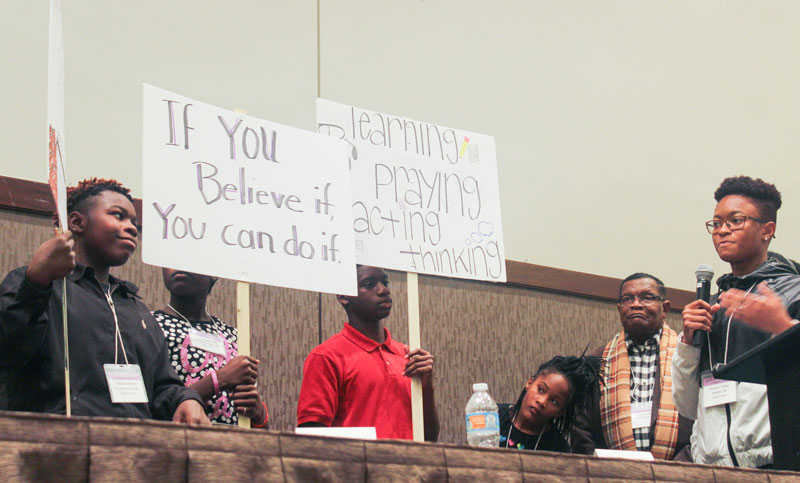
CHARLESTON—Five words might not seem like a lot in the fight against the tide of racism and hatred. They are a beginning, though, a small and simple one that Bishop Edward K. Braxton of the Diocese of Belleville, Ill., gave to more than 120 people who attended the Black Catholics Heritage Celebration in Charleston Dec. 10.
Listen. Learn. Think. Pray. Act.
Five simple things that everyone in the Church can do to begin the process of racial reconciliation.
Bishop Braxton said he had no way of knowing he would be in Charleston during a week in which two of the city’s racial tragedies made fresh headlines.

The trial of former North Charleston police officer Michael Slager, accused of murder in shooting an unarmed Walter Scott in the back as he ran away, had just been declared a mistrial. Meanwhile, avowed white supremacist Dylann Roof was standing trial in a nearby Charleston courtroom, facing the death penalty for the shooting deaths of nine people at Emanuel African Methodist Episcopal Church in June 2015. Roof has admitted to killing them because they were African-American.
Bishop Braxton arrived a day before the event and spent time in prayer in the historic church.
“I did not know that this would be the week that would bring me physically into that sanctuary, so close to that room where those nine people died,” he said.
“In a way, the fact that I am here this week when the whole world is focusing on these trials and these events, it is almost so profound to me that I feel we should not speak but ponder these events in silence,” he continued. “However, all of you here have been pondering these events much more deeply than those of us from afar.”
Bishop Braxton was asked to speak on the Catholic Church and the Black Lives Matter movement, which emerged over the past two years in response to police shootings of unarmed black men and other incidents nationwide.
He said many people in the white community have responded to Black Lives Matter by stressing the fact that all lives matter in God’s eyes, and he noted this is an important truth backed up by Catholic teaching on the sanctity of all human life.

What many people fail to understand, Bishop Braxton said, is the movement tries to call attention to the fact that in certain situations, black lives do not seem to be treated with that sanctity.
“The litany of events like the shootings of Walter Scott, and of Alton Sterling and Philando Castile this summer, is ongoing,” he said. “The fact is, it is the case that for whatever reason, often when a young man of color is stopped by the police, often before the incident is over his life is over. People feel these young men are tried, convicted and executed on the street. That is a source of grief … the fact is that in certain circumstances, different people’s lives are more in peril than others.”
He said calls for justice must include the whole scope of the Church’s teachings on the sanctity of life.
“Those who proclaim Black Lives Matter must also not be silent about violence in the black community, not be silent about abortion and also must be aware of the need to repudiate violence against police and others,” he said. “This is why Charleston is in a unique position to lead the country at this moment. The words of reconciliation, peace and forgiveness that came from the families of Walter Scott and the Emanuel Nine can guide others. They showed we have the ability to both mourn, seek justice and not have hatred grow in our hearts.”
The problem of race in this country, held in glaring relief in the days after the events of the past year, may seem daunting but are not overwhelming, he said. The bishop urged people to follow the five words: Listen to each other, learn and think about the issues, pray for justice and healing, and act to the best of your ability to make change.

Bishop Braxton’s message resonated throughout the daylong event, which included Mass celebrated by Bishop Robert E. Guglielmone. Bishop Guglielmone also spoke on the history of black Catholics in the Diocese of Charleston and how it was necessary to come to terms with some parts of its racial history, such as the fact that Bishop Patrick Lynch owned slaves.
“We have to look at our history and … we have to learn from it,” Bishop Guglielmone said. “The racism of the past cannot be allowed to exist today. We have to change the hearts of people, try to work together to better the lives of everybody and realize we are all children of the same God.”
Toward the end of the celebration, Charleston musician Charleton Singleton led an uplifting workshop on traditional music. He discussed the history and importance of spirituals in the African American church, and asked members of the audience to talk about their favorite ones.
It seemed fitting in light of the day’s discussions that one woman in the room repeatedly named the song “I Shall Not be Moved.”
Singleton repeated the chorus of that song of perseverance through God, a message that may resonate as the rest of those in the room look to the future.
The event was sponsored by the diocesan Office of Ethnic Ministries.
Top photo, Miscellany/Christina Lee Knauss: Amiyah Toney (right) of Sumter leads a presentation held during the youth track segment of the Black Catholics Heritage Celebration held Dec. 10 in Charleston.


